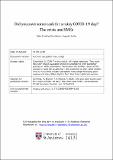Files in this item
Did you save some cash for a rainy COVID-19 day? The crisis and SMEs
Item metadata
| dc.contributor.author | Cowling, Marc | |
| dc.contributor.author | Brown, Ross | |
| dc.contributor.author | Rocha, Augusto | |
| dc.date.accessioned | 2020-09-11T16:30:04Z | |
| dc.date.available | 2020-09-11T16:30:04Z | |
| dc.date.issued | 2020-11-01 | |
| dc.identifier | 269505815 | |
| dc.identifier | d99240ee-9ca0-449e-bcae-de8f5442e132 | |
| dc.identifier | 000556329700001 | |
| dc.identifier | 85089142646 | |
| dc.identifier.citation | Cowling , M , Brown , R & Rocha , A 2020 , ' Did you save some cash for a rainy COVID-19 day? The crisis and SMEs ' , International Small Business Journal , vol. 38 , no. 7 , pp. 593-604 . https://doi.org/10.1177/0266242620945102 | en |
| dc.identifier.issn | 0266-2426 | |
| dc.identifier.other | crossref: 10.1177/0266242620945102 | |
| dc.identifier.other | ORCID: /0000-0001-8419-476X/work/78528454 | |
| dc.identifier.other | ORCID: /0000-0002-6164-7639/work/82179620 | |
| dc.identifier.uri | https://hdl.handle.net/10023/20609 | |
| dc.description.abstract | As COVID-19 spreads across the globe, a common public policy response has been to enforce the temporary closure of non-essential business activity. In some countries, governments have underwritten a proportion of the wage income for staff forced to furlough or broadened their welfare systems to accommodate newly laid off workers or small business owners. While these actions are helpful, they do not explicitly address the lack of sales trading activity on business income and cash balances. In commentary, we identify what types of businesses have been increasing their cash holdings in the lead up to COVID-19 as an indication of what types of small and medium-sized enterprises (SMEs) are most at risk if the lockdown extends for a protracted period of time. We find that only 39% of the of businesses were bolstering their cash balances leading up to COVID-19 which suggests that 61% of businesses may run out of cash, including 8.6% that had no retained earnings whatsoever with micro firms at particular risk. The importance of precautionary saving for SMEs is critical to enhance resilience when Black Swan events occur. | |
| dc.format.extent | 514649 | |
| dc.language.iso | eng | |
| dc.relation.ispartof | International Small Business Journal | en |
| dc.subject | Cash balances | en |
| dc.subject | COVID-19 | en |
| dc.subject | Precautionary saving | en |
| dc.subject | Risk | en |
| dc.subject | SMEs | en |
| dc.subject | HD28 Management. Industrial Management | en |
| dc.subject | 3rd-DAS | en |
| dc.subject.lcc | HD28 | en |
| dc.title | Did you save some cash for a rainy COVID-19 day? The crisis and SMEs | en |
| dc.type | Journal article | en |
| dc.contributor.institution | University of St Andrews. School of Management | en |
| dc.contributor.institution | University of St Andrews. Centre for the Study of Philanthropy & Public Good | en |
| dc.contributor.institution | University of St Andrews. Centre for Responsible Banking and Finance | en |
| dc.identifier.doi | 10.1177/0266242620945102 | |
| dc.description.status | Peer reviewed | en |
This item appears in the following Collection(s)
Items in the St Andrews Research Repository are protected by copyright, with all rights reserved, unless otherwise indicated.

